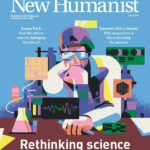Elon Musk claims to be inspired by The Hitchhiker’s Guide. But did he understand the book? Our future may depend on it

In Silicon Valley, where tech bros tend to revere Tolkien’s The Lord of the Rings, Elon Musk stands out for his love of a very different book: The Hitchhiker’s Guide to the Galaxy. Atheistic, absurd and created in the 1970s, Elon Musk is currently the world’s richest man.
Musk, who calls Hitchhiker’s creator Douglas Adams his favourite philosopher, emblazoned the book’s famous advice, “DON’T PANIC!”, on the dashboard of a Tesla Roadster he launched into space. He also plans to name his first Mars-bound ship after a spacecraft from the book.
For those only recently arrived on Earth, The Hitchhiker’s Guide to the Galaxy is a science fiction comedy series. Beginning as a BBC radio show in 1978, it expanded into a five-book trilogy, television show, video game and movie. The Guide in the title alludes to a book given to the everyman character, the human Arthur Dent, which offers advice for making sense of an infinitely complex and confusing universe. Musk is not the first reader to have drawn from the wisdom buried in its principles. But how well does he really understand the book? Given his economic and now political influence in the Trump administration, the fate of the world may now hang on one tech billionaire’s interpretation of a cult sci-fi classic.
So, let’s see if Musk is abiding by the Guide.
5 Lessons Musk Has Actually Learned
1. It’s All About the Question
Musk’s biggest takeaway? Ask the right questions. In the Guide, an alien species of hyper-intelligent, pan-dimensional beings build a gigantic supercomputer to calculate the answer to “life, the universe, and everything”. The computer, Deep Thought, spends 7.5 million years on the problem, only to arrive at the cryptic answer “42”. The problem: the question was too vague.
Musk sees a crucial lesson here. True skill lies not in merely answering questions, but in knowing how to ask the right ones. If an engineer asks, “How can I optimise this part?” before asking “Do we need this part?” they risk wasting time. Once you find the right question, Musk says, the answer is relatively easy – though his definition of “easy” may be one of which many of us ordinary humans were previously unaware (see Lesson 2).
2. Obsession Wins
In the Guide, the Krikkit people – an otherwise charming and delightful alien species – make a shocking discovery: beyond the dust cloud encasing their planet lies an entire galaxy. This revelation instantly transforms them into fanatical xenophobes, convinced that the rest of the galaxy must be obliterated. Their superpower? Relentless obsession. “We can’t win against obsession,” one would-be victim laments, “They care, we don’t. They win.”
Musk shares the obsessive element of the Krikkit mindset. His work philosophy calls for 80- to 100-hour workweeks (whether or not this includes podcast appearances is unclear) and a “do it or die trying” mentality. As a result, although the Krikkit people hold the record for the shortest time between discovering space and launching a spaceship into it, Musk comes a close second.
Whether Musk has taken Adams’ deeper point that unchecked obsession might be ever so slightly less useful than the ability to occasionally stop, have a really hot cup of tea and rethink one’s goal, remains an open question.
3. The Need for Struggle
In the Guide, doctors cure all diseases – only to find that complete cures come with many unpleasant side-effects, including boredom and apathy. Their solution? Recreate ailments in “popular, easy-to-use forms”. This leads to the creation of pseudo-fractures (“all the pain, swelling and immobility of a fracture, without the inconvenience of a fracture itself”) and the use of crisis-inducer alarms to simulate the thrill of working under pressure.
Although Musk may not want you to panic, he prefers you on the verge of it. His seemingly impossible deadlines function like the Guide’s crisis inducers, forcing a sense of urgency with the expectation that this environment will spur achievement.
Pressure can indeed fuel breakthroughs, and literally keeps stars alive – but the same stars can collapse into black holes, where nothing escapes, not even the long-lost memory of why you were so worked up in the first place.
4. The World is Not Enough
The Guide begins with the Earth being demolished ostensibly to make way for a hyperspace bypass. Musk’s take-away? Don’t put all your eggs on one planet. Hence, his company SpaceX aims “to make life multi-planetary”. This would ensure humanity’s survival in the face of nuclear war, rogue AI or the consequences of J. D. Vance leading diplomatic relations with alien visitors to Earth.
5. The Need for Direct Communication
At the start of the Guide, Arthur Dent’s house is about to be demolished. He is understandably annoyed, as although the local council made the plans public they placed them inside a locked filing cabinet, in a disused lavatory, in a cellar with neither lights nor stairs, with a sign on the toilet door saying “Beware of the Leopard”. Musk shares the Guide’s disdain for bureaucratic nonsense. He champions ultra-fast, unfiltered communication within his companies. Such direct communications can include being bluntly informed that you’re fired.
Five Crucial Lessons Musk Failed to Learn
1. Power Shouldn’t Belong to Those Who Want It
The Guide warns that anyone who seeks power is unfit to wield it. “Anyone who is capable of getting themselves made president”, says the Guide, “should on no account be allowed to do the job.”
Musk seems to have missed this lesson. Then again, the Guide also states that the president’s job isn’t to wield power but to cause outrage and distract from those with real power. Zaphod Beeblebrox, the galaxy’s two-headed president who spends two years of his tenure in jail for fraud, is supremely good at his job. So, perhaps Musk has not only learnt this lesson, but learnt it too well.
2. Loose Lips Launch Intergalactic Battleships
Musk champions free speech on X, but the Guide repeatedly warns about the dangers of communication. The Babel fish, which instantly translates all languages, thereby removing barriers to communication between peoples, causes “more and bloodier wars than anything else in the history of creation”. The Guide even suggests that speech is often used as an excuse not to think. As one character says of humans, “If they don’t keep on exercising their lips … their brains start working.”
3. Democracy is Complicated
Musk sees direct democracy (where citizens vote directly on laws and policies) as the future – on both X and on Mars. But the Guide takes a more cynical view. On one planet, the people live under the rule of lizard overlords, whom they despise. Strangely, however, their society is a democracy. Every election, the people dutifully turn up to vote for a lizard, fearing that if they don’t, the wrong lizard may be elected. It never occurs to them that they could simply choose someone who isn’t a lizard.
Musk underestimates how much control lies not in the vote itself but in who decides what is on the ballot. Then again, perhaps he doesn’t: vox populi, vox Musk?
4. No one is Useless
In the Guide, the ruling class of the planet Golgafrincham tricks “useless” citizens – hairdressers, jingle writers, management consultants and telephone sanitisers – into boarding a spaceship under false pretences. The plan? Send them away to crash-land elsewhere.
Musk has a Golgafrincham management style, favouring mass firings. While this may work in the tech industry, applying the same philosophy to government services – like public health officials – seems questionable. Indeed, Adams tells us that the Golgafrincham elite were ironically wiped out by a disease contracted from a dirty telephone.
5. Machines Don’t Have the Ultimate Answer
Musk’s AI company, xAI, aims to rigorously pursue truth, tackling our biggest questions. Although the Guide agrees that the pursuit of truth is important, it adds that there comes a point “where you begin to suspect that the entire multidimensional infinity of the Universe is almost certainly being run by a bunch of maniacs.”
So although Musk is careful to ask the right questions, he may have missed the most essential insight of the Guide. It’s a mistake to assume that someone out there knows the answer but refuses to tell. We won’t find the ultimate answers to life by passively asking questions, of humans or AI. We do so by actively living our lives – preferably, as the Guide suggests, supported by really hot cups of tea.
If Musk is The Answer, What is The Question?
Much like a Douglas Adams character, Musk is remarkable – the person most likely to do six impossible things before breakfast. He has taken the Guide’s lessons on obsession, struggle, the art of questioning and ensuring humanity’s survival. Yet he overlooks its insights on communication, democracy and the folly of relying on others for ultimate answers. So, is Musk, like the Guide, an “indispensable companion” for navigating an absurd universe?
Or is he more like the Haggunennon, described by the Guide as the most impatient species in the galaxy? Haggunennons embrace change so recklessly that if they can’t reach a coffee spoon, they may mutate into something “with far longer arms, but which is probably quite incapable of drinking the coffee”. The Guide’s advice for dealing with such protean figures is to run away, terribly fast.
This article is from New Humanist’s Summer 2025 issue. Subscribe now.

